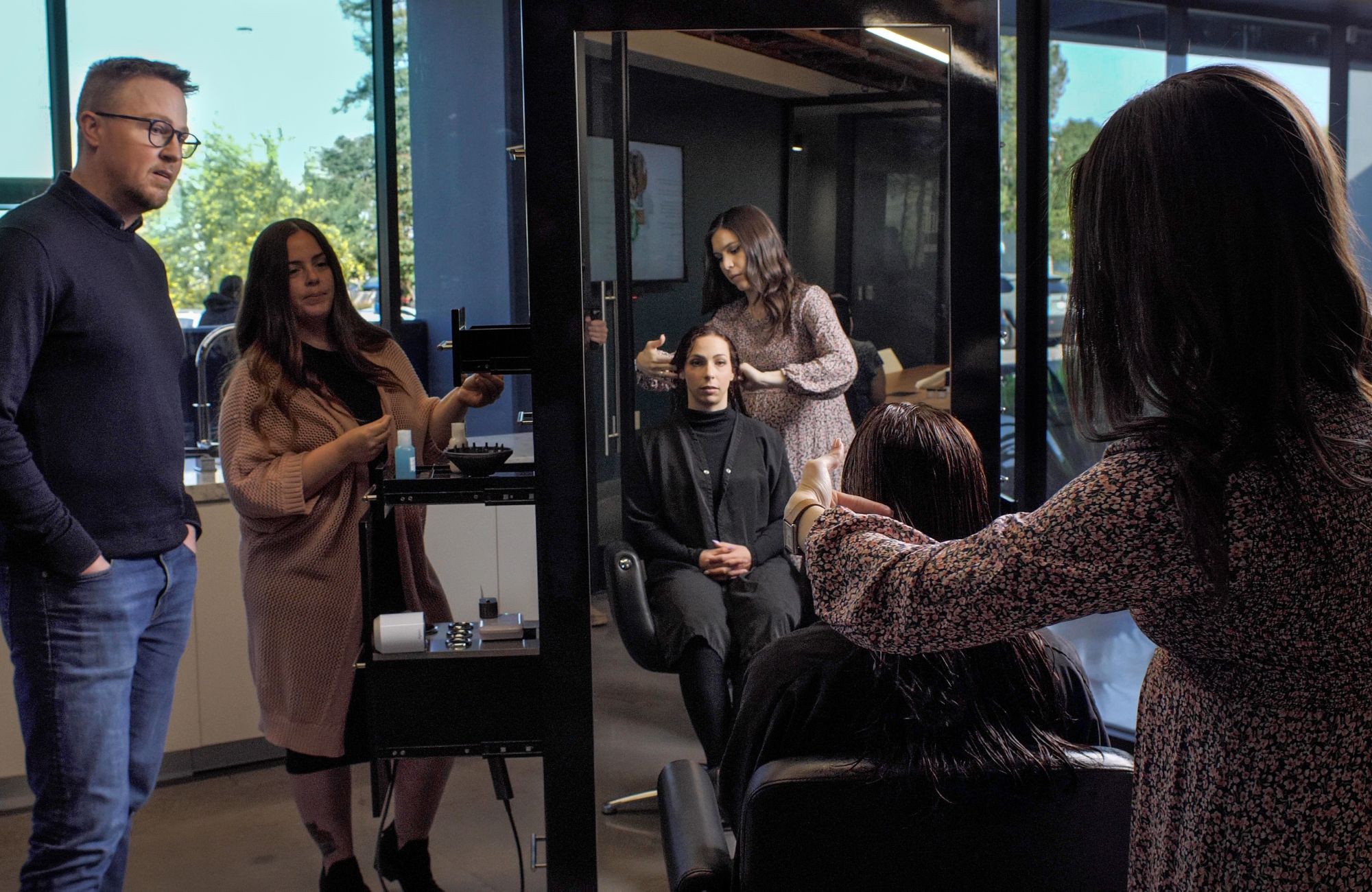
5 Trends Driving Manufacturing This Year, According To Atelier By Voyant Beauty’s Lorne Lucree
Between deinfluencing, inflation and mounting performance expectations, beauty brands face a challenging environment. Lorne Lucree, chief innovation officer at manufacturer Voyant Beauty and head of business unit Atelier, says those looking to succeed in 2023 and beyond must find ways to up the ante for customers whose shopping habits are becoming more intentional.
“There are tons of cool formula trends, but the biggest trend will be around ways to create implicit value for your brand community,” he says, pointing out the departures of influencer-led brands like Item Beauty by Addison Rae from Sephora and the recent backlash against Brad Pitt’s skincare line Le Domaine as evidence that flash isn’t favored in the current climate. “A product really has to stand on its own. Brands need a stronger story to justify the price for value-driven consumers.”
Launched on Oct. 3, Atelier is helping high-growth independent beauty brands hone their unique stories to justify consumers paying for their products. Lucree says Atelier has been able to deliver quick wins for brands at all stages through, among various offerings, product development guidance through its custom clairVoyant Insights Toolbox along with cost optimization and scaling support for surging brands that have outgrown their original manufacturer.
Prior to Voyant, Lucree was a VP at Luxury Brand Partners, the incubator behind brands R+Co, IGK and One/Size by Patrick Starrr. Although he’s conceived and commercialized over 400 products, he didn’t just rely on that experience alone to establish Atelier’s approach.
Lucree conducted 50-plus hours of one-on-one research with product development and operations leaders at fast-growth brands with a range of funding, private equity entities and venture capital firms active to beauty to inform Atelier’s service model. He also drew learnings from early-stage brands from being a product development mentor for Ulta Beauty’s Muse Accelerator program.
Top brand candidates for Atelier’s operational scale and expertise are those poised for exponential sales jumps “Working with a contract manufacturer is like dating,” says Lucree. “You have to connect with them from both a service and an innovation standpoint, so we’ve been really strategic about the customers entering Atelier. It’s all about managing expectations.”
Voyant handles skin, body, hair, fragrance and home product production. The company has around 4,000 employees and 11 manufacturing facilities in the United States, Canada and Europe encompassing in excess of 4 million square feet.
Below, Lucree identifies five trends he believes will drive beauty manufacturing this year.

Consumer Insights-Driven Brand Strategies
Lucree counsels brands to marry intuition with insights to steer their product development. Atelier has developed a proprietary set of data-driven tools deployed to paint a narrative based on facts, including reports on bestselling products enabling brands to come prepared to meetings with retail buyers.
“It’s everything I wished I had access to when I was at a brand,” says Lucree. “A high-growth cosmetics brand was recently devouring their custom report from us because we found their core customer was also talking a lot about curly hairstyling as a key concern on TikTok and other socials. They couldn’t understand why, when a mega influencer using their products wears her hair curly, they get so much more engagement on social. It was amazing to show them that it was really linked. Insights like these are hyper-custom to the brand and allow for credibility when entering a new category.”
Product renovations
It takes a lot of money to educate consumers on an entirely new product. Oftentimes, focusing on refining existing formulas is the best bet. Lucree suggests founders examine their existing assortments and delve into how to shake them up based on customer reviews and changing consumer preferences.
Atelier taps artificial intelligence to distill product ratings and reviews into a digestible format for recommendations on product improvements. It can also harness tools to decipher ingredients and benefits that are bubbling up in shopping patterns, allowing brands zero in on them when thinking through marketing strategies and packaging design.
“Let’s say on Instagram, your key demographic is Hispanics aged 20 to 34. We know that hyaluronic acid is their number three most engaged with ingredient, but we can also use that with supporting data to understand if that interest is predicted to increase or decrease,” says Lucree. “Interest in hyaluronic acid is predicted to increase 1.1% over the next 12 months. So, we would feel confident with you reformulating to use hyaluronic acid or to increase your education around how your products use that ingredient.”
Atelier’s is depending on its AI tools to assist in the reformulation of a masstige haircare brand’s full product line. The line aims to become compliant with regulatory standards while renovating products receiving lower reviews than the rest of its assortment.
Lucree says brands frequently ask Voyant to analyze formulations to pin down raw materials fueling costs and find equal or better alternatives that aren’t as costly. He says, “Brands can utilize their contract manufacturers to negotiate cost savings for them and pass this along to consumers so price increases don’t need to happen if supply chains continue to be under pressure.”
Multiple Sizes
In the wake of the pandemic, beauty consumers have become more sensitive to value. However, they aren’t necessarily hunting for the cheapest products. Instead, they’re paying close attention to the perceived value of their purchases. To achieve a good value, they’re shopping at big-box stores and buying jumbo-sized options that provide value on a per-ounce basis or travel-sized options that have palatable entry-level prices.
Lucree expects value consciousness to last for the duration of 2023 as the economic shakiness persists. At a manufacturer, he says, “Sometimes the fear is that brands are going to cancel orders, but, actually, we’ve seen that people just want to think creatively, and that’s where we, given our scale and flexibility, can do those large pouch formats, minis or travel deluxe sizes and think outside the box with them.”
Clinical Testing
Lucree predicts that consumers will increasingly expect brands, especially skincare and haircare brands, to validate their efficacy. For brands, clinical testing can be costly and time-consuming. Lucree advises brands to lean on their ingredient supplier’s testing capabilities. Voyant has sought out strategic relationships with ingredient suppliers to bolster its in-house clinical testing capabilities.
Lucree says, “We now work with an up-and-coming supplier in South America because they have amazing testing equipment, the ability to implement custom technology, and they’ve done all these great validation studies and they’re dying to work with these beauty brands.”
He adds that a body care brand is working with the supplier to develop custom haircare technology using the supplier’s capabilities to realize an exclusive claim backed by clinical testing on a particular complex, free of charge to the brand through its partnership with Atelier. Lucree says, “On top of that, the project is moving very quickly which is really important in these situations.”
Fragrance EXTENSIONS
The fragrance category exploded amid the pandemic in a surprise to many in the beauty industry. In a recent Beauty Independent In Conversation webinar episode Nini Zhang, managing director of investment banking at Bank of America, noted that beauty investors and acquirers are concentrating on the segment following Puig’s purchase of Byredo in June of 2022.
Voyant Beauty is one of the largest hydro-alcoholic fragrance fillers in the United States, an area that represents about 10% of its total business, and Lucree confirms fragrance remains a strong category. He says “We are seeing a lot of action in performance, alcohol-free and clean fragrances.”
Traditional perfumes and home sprays are staying big, but Lucree is noticing a rising interest in performance products outside of fragrance—haircare or body care items, for instance—that incorporate upcycled byproducts of fragrance production to leverage their benefits. He explains, “For example, if a haircare product uses a patchouli fragrance and actually included that raw material as an active, you could also speak to the benefits of patchouli for the scalp to rebalance sebum production, which is really interesting.”





Leave a Reply
You must be logged in to post a comment.